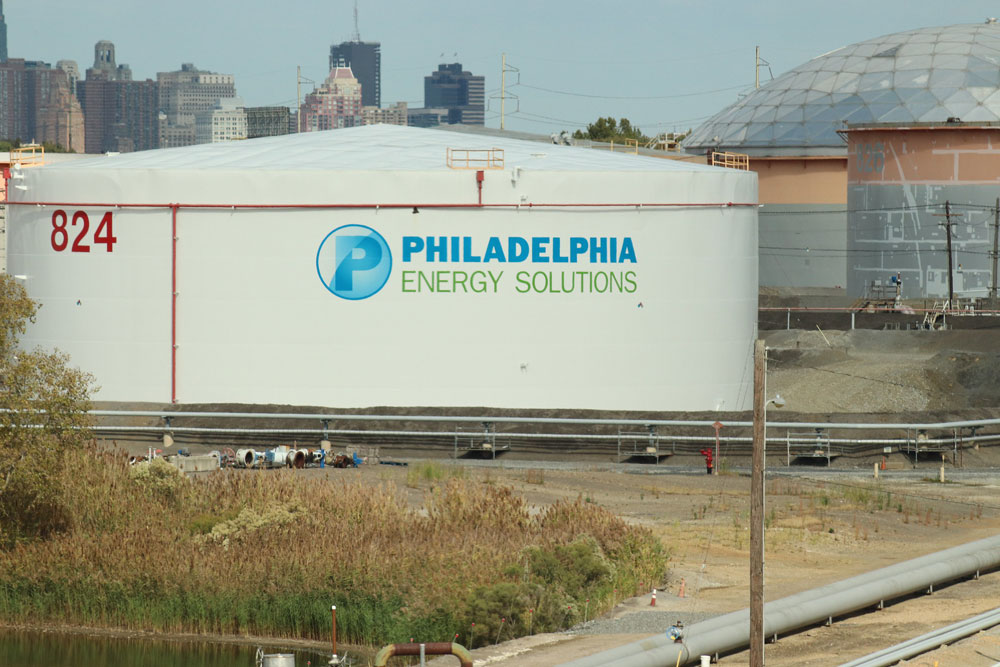
January 10, 2020; In These Times
A community battle over how to handle the closure of an oil refinery serves as a microcosm of many important fault lines confronting activists seeking rapid action to address the world’s climate emergency. As an in-depth article by Mindy Isser of In These Times highlights, labor versus the environment is one of those fault lines. But look a little deeper, and race is clearly another. In fact, this conflict serves as a chilling reminder of the ways in which labor, climate activists, communities of color, and low-income residents are often played against each other by economic interests that are the biggest contributors of global heating and are often most insulated from it.
In the summer of 2019, the Philadelphia Energy Solutions (PES) oil refinery exploded. Shortly after, PES declared bankruptcy and laid off 2,000 workers. The refinery site eventually sold at auction on January 21st to a redevelopment company. The company says it has no plans to reopen the refinery, but labor and environmental advocates have squared off nonetheless.
A local community nonprofit, Philly Thrive, has sought to close the PES refinery since 2015, citing linkages between refinery pollution, poor air quality, and high levels of asthma and cancer. Philly Thrive wants to ensure the site is not reopened as a refinery. In response, the president of the United Steelworkers local (USW 10-1), the union representing refinery workers, publicly condemned Philly Thrive for being uninterested in the hardships its members are facing.
Isser nicely unpacks the nuances involved in the situation, pointing out that refinery employees who had earned six-figure incomes have little hope of replacing that income outside of another refinery job, and no formal plans have been offered for how they could retrain in new industries at a remotely similar pay scale. At the same time, community residents near the refinery, which was repeatedly fined for environmental violations, are predominantly low-income and people of color.
Sign up for our free newsletters
Subscribe to NPQ's newsletters to have our top stories delivered directly to your inbox.
By signing up, you agree to our privacy policy and terms of use, and to receive messages from NPQ and our partners.
The complexity of the situation in Philadelphia is not unique. But it does show how urgent it is to look closely at how competing interests are understood and enacted in response to the global climate crisis.
Conflicts between unions and environmental groups are not new. Many unions support proposals like the Green New Deal, but this support is hardly universal. Unions and environmentalists have squared off before, perhaps most infamously when the AFL-CIO supported the Dakota Access pipeline in 2016. And of course, labor unions in the US have a mixed record on racial inclusion, as do many environmental organizations.
But as Isser points out, to a large extent, the PES refinery is a classic case of a very small number of corporate executives making a staggering amount of money at the expense of everyone else, then vanishing, leaving residents behind to fight amongst themselves for the scraps. PES executives were paid $4.59 million in retention bonuses after the refinery explosion and bankruptcy filing. Both Philly Thrive and USW 10-1 members expressed anger about the payoffs, but this common anger did not lead the two groups to find common ground.
Fundamentally, organized labor, communities of color, and low-income communities are all more vulnerable to climate change than corporate leadership and the economic elite. And if organizing fails to build from that fundamental shared vulnerability, we run the risk of both failing to create a solution and repeating the outcome of previous us-against-them community battles that benefit neither workers nor the environment.
As a 2016 New York Times profile of an Oregon logging town pointed out, after the heyday of manual logging in the 1980s, the forests were depleted, and the logging companies automated, downsized, and moved out. Left behind was a devastated environment and a dying economy that are only now beginning to rebuild, nearly 30 years later. Of course, with our present climate crisis, we don’t have 30 years.—Ellen Davis













